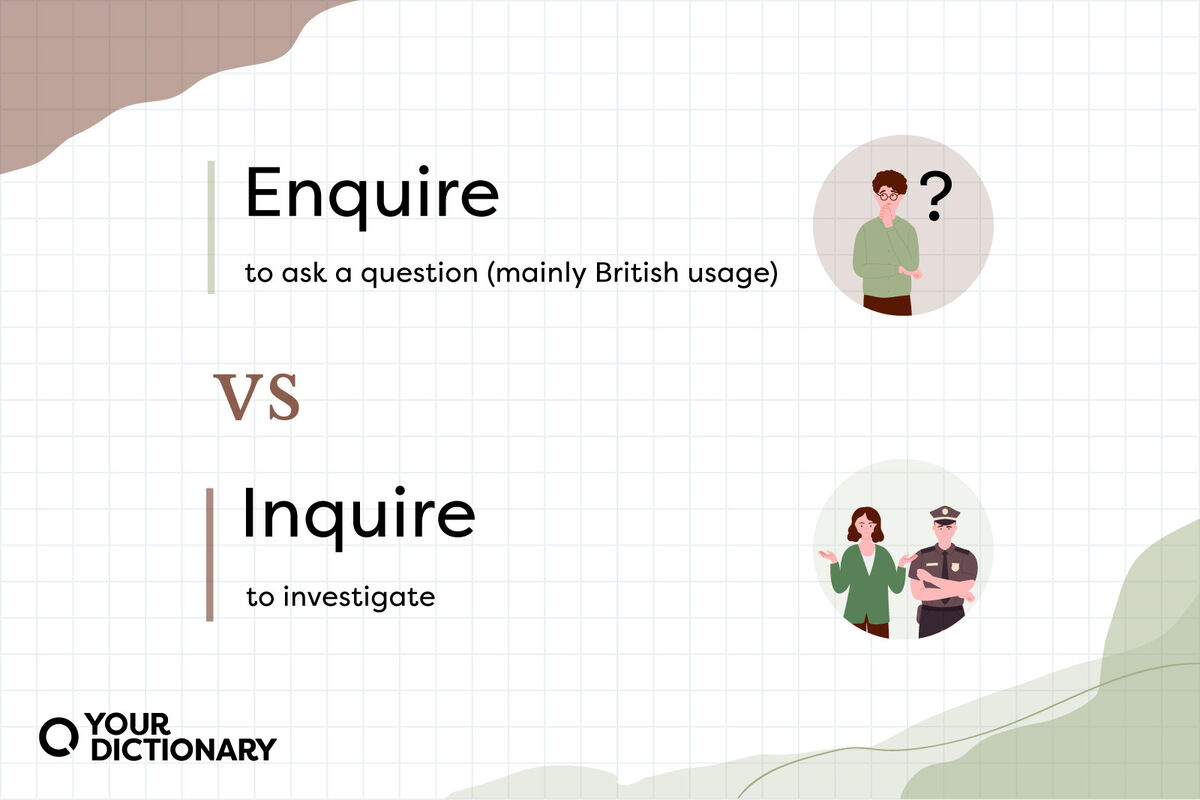
Inquire and enquire come from the same Latin word, quaere, which means “to ask or seek.” But even though they have similar pronunciations, meanings, and origins, inquire and enquire aren’t always interchangeable. It all depends on where you live — and what information you’re looking for.
Enquire: To Ask a Question
Primarily used in British English, the word enquire means “to ask an informal question.” It comes from 14th-century Middle English before many words with the prefix en- were changed to in-. Even though American readers may wrinkle their nose at enquire, it’s quite a bit more popular in the United Kingdom than the similar-sounding inquire.
Examples of ‘Enquire’ in a Sentence
Use enquire when you’re asking a general question that doesn’t involve a detailed answer. For example:
- Manny enquired about the store hours on Saturdays.
- Can I enquire about where you got that amazing purse?
- If you like that girl, you should enquire about her name.
Inquire: To Investigate
Like enquire, the verb inquire seeks information. But the information is typically more detailed and formal than when you’d use enquire. Worldwide, inquire is more common than enquire, making it the preferable choice when writing or speaking about an investigation.
Examples of ‘Inquire’ in a Sentence
Use inquire when you're asking a question that requires a more formal and detailed answer.
- The police inquired as to our whereabouts during the night of the robbery.
- My legal team has inquired about the judge’s ability to be impartial in this trial.
- During the audit, the IRS agent inquired about all of Susan’s purchases.
Inquiry vs. Enquiry
Do the same rules apply for the noun forms inquiry and enquiry? Generally, yes — though enquiry is actually more popular than inquiry around the world (except in the United States). Rather than describing the action of seeking information, these terms refer to a particular quest for information. Inquiry and enquiry can name:
- an investigation - such as who committed a crime or what started a fire
- a request for information - such as background screening record or credit report for a prospective tenant
- a review of facts or scientific principles - such as exploring a research question or seeking support for a hypothesis
But enquiry still refers to informal questions, as in “I’m making an enquiry about your return policy,” while inquiry should refer to more serious investigations, as in “I’m making an inquiry about your discriminatory hiring process.” In fact, even British style guides recommend inquire over enquire when it comes to formal investigations.
What About ‘Query’?
The word query, which means “question,” is another term that comes from the Latin quaere. However, the scope of a query is much more limited than an enquiry or inquiry — it’s more of a yes-or-no question than an investigation. For example:
- The author sent a query letter to an agent, asking if she would represent him.
- The author sent an inquiry letter to an agent, asking what he needed to do in order to improve his book for publication.
In this case, a query letter results in a “yes” or a “no.” But an inquiry letter is more involved and requires a more detailed explanation.
Asking the Right Questions
The differences between enquire and inquire are nuanced enough that a reader isn’t likely to notice them — especially if you’re writing for a British audience. If you’re addressing American readers, it’s probably best to choose inquire and inquiry, no matter the question you’re asking.